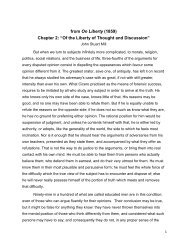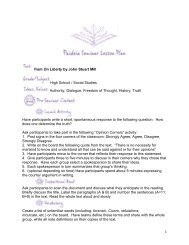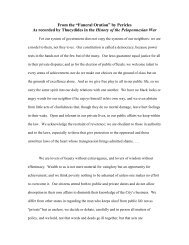Rousseau_contrat-social
You also want an ePaper? Increase the reach of your titles
YUMPU automatically turns print PDFs into web optimized ePapers that Google loves.
distinguish natural liberty, which is bounded only by the strength of<br />
the individual, from civil liberty, which is limited by the general<br />
will; and possession, which is merely the effect of force or the right<br />
of the first occupier, from property, which can be founded only on a<br />
positive title.<br />
We might, over and above all this, add, to what man acquires in the<br />
civil state, moral liberty, which alone makes him truly master of<br />
himself; for the mere impulse of appetite is slavery, while obedience to<br />
a law which we prescribe to ourselves is liberty. But I have already<br />
said too much on this head, and the philosophical meaning of the word<br />
liberty does not now concern us.<br />
9. REAL PROPERTY<br />
EACH member of the community gives himself to it, at the moment of its<br />
foundation, just as he is, with all the resources at his command,<br />
including the goods he possesses. This act does not make possession, in<br />
changing hands, change its nature, and become property in the hands of<br />
the Sovereign; but, as the forces of the city are incomparably greater<br />
than those of an individual, public possession is also, in fact,<br />
stronger and more irrevocable, without being any more legitimate, at any<br />
rate from the point of view of foreigners. For the State, in relation to<br />
its members, is master of all their goods by the <strong>social</strong> contract, which,<br />
within the State, is the basis of all rights; but, in relation to other<br />
powers, it is so only by the right of the first occupier, which it holds<br />
from its members.<br />
The right of the first occupier, though more real than the right of the<br />
strongest, becomes a real right only when the right of property has<br />
already been established. Every man has naturally a right to everything<br />
he needs; but the positive act which makes him proprietor of one thing<br />
excludes him from everything else. Having his share, he ought to keep to<br />
it, and can have no further right against the community. This is why the<br />
right of the first occupier, which in the state of nature is so weak,<br />
claims the respect of every man in civil society. In this right we are<br />
respecting not so much what belongs to another as what does not belong<br />
15











